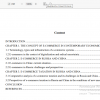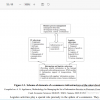Тема: INTERNATIONAL ASPECTS OF E-COMMERCE IN RUSSIA AND CHINA: CHALLENGES AND PERSPECTIVES
Закажите новую по вашим требованиям
Представленный материал является образцом учебного исследования, примером структуры и содержания учебного исследования по заявленной теме. Размещён исключительно в информационных и ознакомительных целях.
Workspay.ru оказывает информационные услуги по сбору, обработке и структурированию материалов в соответствии с требованиями заказчика.
Размещение материала не означает публикацию произведения впервые и не предполагает передачу исключительных авторских прав третьим лицам.
Материал не предназначен для дословной сдачи в образовательные организации и требует самостоятельной переработки с соблюдением законодательства Российской Федерации об авторском праве и принципов академической добросовестности.
Авторские права на исходные материалы принадлежат их законным правообладателям. В случае возникновения вопросов, связанных с размещённым материалом, просим направить обращение через форму обратной связи.
📋 Содержание
CHAPTER 1. THE CONCEPT OF E-COMMERCE IN CONTEMPORARY ECONOMICS 7
1.1 Terminology, types and infrastructure of e-commerce systems 7
1.2 E-commerce in the context of digitalization and radical uncertainty 16
CHAPTER 2. E-COMMERCE IN RUSSIA AND CHINA 24
2.1 E-commerce in China: current situation 24
2.2 E-commerce in Russia: challenges and perspectives 31
CHAPTER 3. E-COMMERCE TAXATION IN RUSSIA AND CHINA 40
3.1 Comparative analysis of e-commerce taxation and its challenges in Russia and China 40
3.2 Perspectives of e-commerce taxation in Russia and China in the conditions of new uncertainty 48
CONCLUSION 56
REFERENCES 60
📖 Введение
Recently, the spread of COVID-19 pandemic has significantly changed the development path of Russian and Chinese e-commerce. On the one hand, this event has fostered its growth as a response to lockdown and changed consumers behavior and attitude towards online shopping. On the other hand, it has created new issues and challenges, due to recession, closed borders and disturbed trading mechanisms. Anyway, these tendences may possible have a long-run effect.
These circumstances mentioned above determine the choice of the topic of this master’s thesis, its goal, objectives, object and subject.
The goal of this master’s thesis is to define the current state, main problems and prospects of the development of electronic commerce in Russia and China.
The achievement of this goal was pursued via setting and solving a set of logically interrelated objectives, consistently revealing the topic of this paper:
• analyzing the terms, classifications and infrastructure of e-commerce;
• determining the role of digitalization and radical uncertainty in online trade;
• analyzing the current state of domestic and cross-border e-commerce in China;
• analyzing the challenges and perspectives of domestic and cross-border e-commerce in Russia;
• comparing Russian and Chinese e-commerce taxation and identifying their challenges;
• observing the state of Russian and Chinese e-commerce taxation in the conditions of the new uncertainty.
The object of this research is the economic entities of e-commerce systems.
The subject of the research is the mechanisms of trade and regulation existing in the e-commerce systems in Russia and China at the present stage.
Background. Information technology research issues, including the problems of e-commerce development, are reflected in the papers of many scientists. R. R. Dyganova observes and explains the essence of most widely accepted e-commerce models 3. H. B. Okholm considers value delivery methods used in e-commerce 4. A. N. Agafonova determines the features and elements of the infrastructure of ecommerce systems at the micro and macro levels 5. E. N. Smirnov pays attention to digitalization processes and their impact on cross-border e-commerce 3 4 5 6. The concept of radical uncertainty is taken into consideration through the researches of J. M. Keynes 7 8 and F. Knight 8. N. N. Taleb elaborates on the black swan theory 9 10 11 12 13 14 15 and the concept of antifragility 10. All these concepts are essential to be observed in regards with e-commerce.
L. Zhang, S. Cheng 11 focus on the duality of digitalization in China, while V. G. Khalin, G. V. Chernova do the same in terms of Russian digitalization 12, and therefore, e-commerce as well. A. I. Pogorletskiy presents new opportunities for taxation and tax regulation, contributing to the development of e-commerce 13, focuses on the priority of the regulatory (stimulating) role of taxes when they are used as tools of influencing international online trade, and considers possible innovations in the cross-border ecommerce taxation in Russia 14. L. V. Polezharova and A. M. Krasnobaeva, examined the possibility of the introduction of a tax on digital services in Russia, by focusing on the prematurity of this decision 15. Zhang Junjun identified 7 types of influence of e-commerce development on the Chinese taxation 16, Liu Shuping, Wang Mingxing, and Xu Yiqing identified problems in tax planning in China...
✅ Заключение
First of all, the terminology, types and infrastructure of e-commerce systems has been taken into consideration. The analysis of the existing literature has proven the absence of the unique and universal definition and explanation of ‘e-commerce’, nor has it revealed any exact and commonly accepted distinction between the meanings of e-commerce and digital trade. The research mainly focused on two classifications of e-commerce models that are based on e-commerce business transactions and on value delivery methods, which are used in e-commerce. Infrastructure of e-commerce systems, along with its elements and peculiarities at the macro and micro levels has also been considered. E-commerce infrastructure at the macro level consist of telecommunication, IT, logistics, financial activities, control and oversight of the legality of operations. On the other hand, e-commerce infrastructure at the micro level is determined by the organizational forms of doing business and implies business process managerial, IT, logistics, information and logistics subsystems.
Secondly, the concepts of digitalization and uncertainty have been analyzed, and their role in ecommerce has been determined in this research. In modern interconnected and interdependent reality, the benefits of digital transformation for international trade are defined by a complex of aspects. A lot of types of digital infrastructure like the Internet have already been created for a global access. They provide new chances of development, but at the same time create new problems for economic policy, when barriers and regulatory differences between countries remain unchanged. These opportunities and challenges apply to the tax regulation of cross-border e-commerce as well. Digitalization and the COVID-19 pandemics associate e-commerce with such concepts as radical uncertainty, risk, black swan theory, and antifragility. Although the spread of the coronavirus disease is not classified as a black swan, the outcome of this event is difficult to predict and has significantly changed the online trade industry. Owing to antifragility, some e-commerce entities have taken advantage of the existing conditions and have managed as to overcome the difficulties brought by the pandemics, as to achieve some new goals.
Thirdly, the current situation with e-commerce in China has also been observed and analyzed in this master’s thesis. China is regarded as a leader in e-commerce market. B2B, B2C and C2C occupy the biggest share in China’s e-commerce and present rapid development, especially in the service sector. As for value delivery methods in Chinese e-commerce, wholesaling and subscription service are characterized as ones of the fastest growing and perspective sectors. One of the forms of digitalization is presented by e-commerce. Digitalization has a dual nature as it increases the efficiency of the financial services and at the same time threatens to financial stability and complicates the processing of financial supervisory bodies. China has formulated its trading strategy for e-commerce in order to cope with the challenges and opportunities provided by digitalization. E-commerce under the circumstances of the COVID-19 pandemic deserves special attention. On the whole Chinese e-commerce sector is regarded to be mostly antifragile, owing to the increased share of online trade in this country since the self-isolation. The significant role here is also played by the government’s support for small and medium enterprises, which helped them to enter digital market or to expand in it. Another influential factor is Chinese consumers’ preferences to purchase online in the post COVID-19 world, as has been presented in the recent survey. In conclusion, China’s domestic and cross-border e-commerce is highly likely to develop and prosper in the long-run perspective.
Moreover, the challenges and perspectives of Russian e-commerce has also been considered. Ecommerce in Russia is quite young but fast-growing and perspective. Domestic e-commerce prevails over cross-border e-commerce, especially during the COVID-19 pandemic. B2C and C2C are the most widely spread e-commerce models in Russia. B2B sector faces problems with the lack of data and information about their revenues. The drop shipping sector in e-commerce also has problems with monitoring. Most perspective models are D2C and subscription service. As in China, digitalization in Russia is also characterized by duality, and furthermore, Russia has also built its strategy for ecommerce sector. As for the COVID-19 pandemic, it caused a remarkable growth in e-commerce in Russia. Russian domestic e-commerce on the whole can be considered as antifragile, whereas the situation with Russian cross-border e-commerce appears to be an example of the state of radical uncertainty. However, cross-border e-commerce in Russia has also experienced a significant growth. Although Russian consumers activity in online shopping pale in comparison to Chinese ones, it anyway has been transformed due-to lockdown, with growing preferences for online shopping. Russia tends to cooperate with China in the sphere of e-commerce, which seems to have good potential in the future.
As for Russian and Chinese e-commerce taxation, different level of e-commerce development in these countries had also the corresponding influence on the development of their regulation of ecommerce taxation and therefore caused different kinds of challenges. For China these are the problems with transparency of e-commerce transactions, their monitoring, e-commerce enterprises taxation, and problems with their tax planning, while in Russia one of the main problems is the unequal competitive advantage of foreign e-commerce companies exporting to Russia and problems connected with double taxation, when Russian marketplaces are required to pay VAT to Russia and to countries importing Russian goods and services, what leads to a significant tax burden on Russian electronic retailers....





